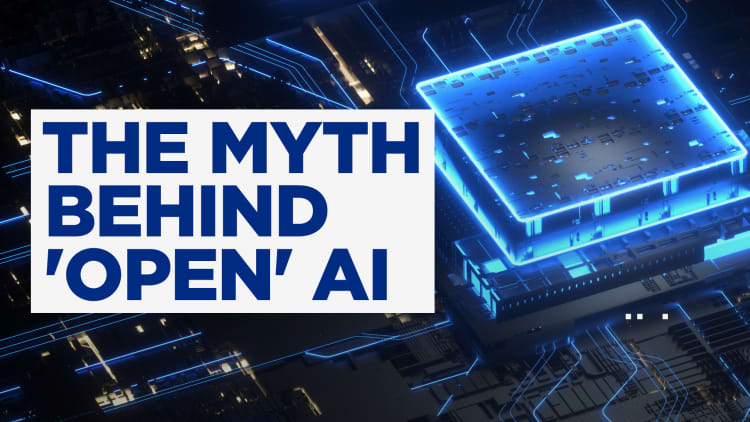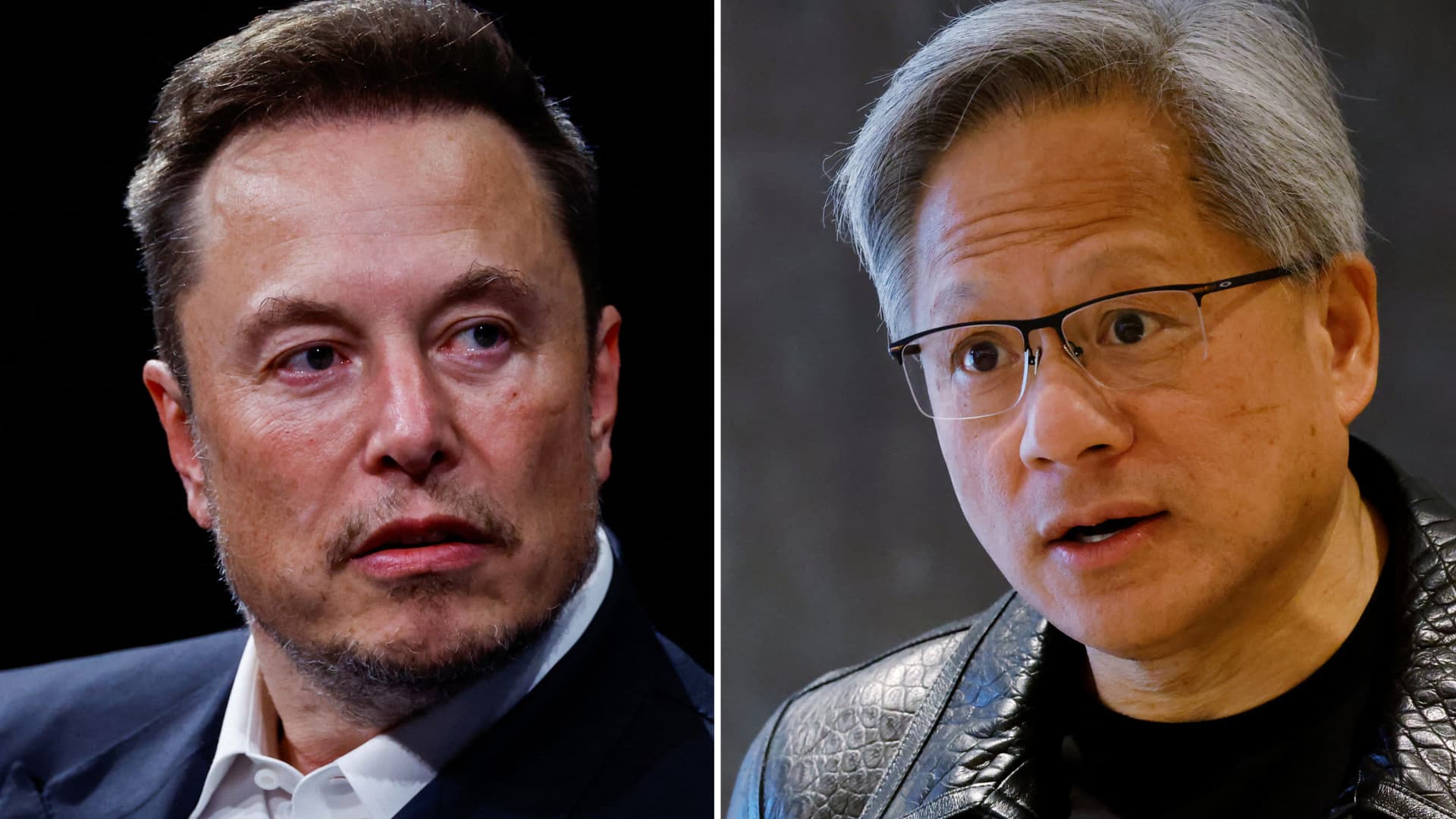Tesla CEO Elon Musk (left) and Nvidia CEO Jensen Huang (right).
Reuters
In November 2023, at a general meeting with employees, Nvidia CEO Jensen Huang was asked if the company would follow suit An apple and Disney and suspends its advertising on X due to rising levels of anti-Semitism and other hate speech on the platform.
X owner Elon Musk said earlier that month that he agreed with a post on the site that accused “Jewish communities” of pushing “anti-white hatred.” A host of brands—Disney and Apple among them—quickly paused their ad campaigns.
Huang’s response was firm but diplomatic, according to people who listened to the meeting but asked not to be named because they were not authorized to speak to the press. He said the chipmaker hasn’t advertised on the X in a very long time and has no plans to do so. However, Huang also stressed that Nvidia would never make public statements against another business.
Left out of Huang’s comment at the time was any detail about Nvidia’s growing coziness with Musk’s business empire.
Nvidia is seeing soaring demand for its graphics processing units (GPUs) and related hardware and services, a boom that has lifted the company’s market cap well above $2 trillion. Nvidia products, including new accelerator chips, provide computing power for generative workloads in artificial intelligence, robotics, research and data center projects.
Last quarter’s revenue jumped a whopping 265% to $22.1 billion, and Nvidia surpassed Intel in total sales last year.
Musk has made promises that his companies will develop sophisticated AI products, and that requires buying much of Nvidia’s technology.
Their cozy relationship was on display this week at Nvidia annual GTC conference in San Jose, California. The event, which attracted an estimated 16,000 attendees, including celebrities like Ashton Kutcher and Kendrick Lamar, had two sessions featuring xAI leaders, the Musk startup officially revealed in July 2023.
Christian Szegedi, co-founder and researcher at xAI who previously worked at Google, speaks in a fireside chat with Bojan Tunguz, data scientist at Nvidia. Another co-founder and research engineer at xAI, Igor Babushkin, an OpenAI and Google veteran, gave an overview of how Musk’s startup is using Nvidia GPUs to help “accelerate learning and inference for their Grok model.” citing the startup’s AI chatbot.
In the Nvidia one press release on Monday, announcing the launch of its Blackwell AI chips, Musk was quoted as saying, “There’s nothing better than NVIDIA hardware for AI right now.”
Musk, who helped create OpenAI before the public split with CEO Sam Altman and other founders, launched xAI to develop AI models and software products.
Meanwhile, its electric vehicle manufacturer Tesla has spent years working on AI software to turn its cars into autonomous vehicles. It is also now developing the Tesla Bot or Optimus, a humanoid robot.
Although the majority of Tesla’s revenue comes from the auto business, Musk often encourages shareholders to think about it differently. In January he said, in a post by X, “Tesla is an AI/robot company that looks to many like a car company.”
Tesla first discussed plans to build a “Dojo supercomputer” at an AI Day presentation in August 2021. Dojo’s goal was to process and train AI models with vast amounts of video and data captured by Tesla vehicles.
“Boy, do they want a lot more GPUs”
Nvidia is at the heart of the AI effort. Last August, former Tesla AI engineer Tim Zaman posted on X that a Tesla AI cluster built using 10,000 of Nvidia’s H100 chips was ready to go.
Musk said in an X post in January that while the Dojo supercomputer cost $500 million to build, “Tesla will spend more than that on Nvidia hardware this year.” He added: “The bet for competitiveness in AI is at least several billion dollars a year at this point.”
Musk said Tesla is “pursuing the dual path of Nvidia and Dojo,” seemingly implying that it is building Dojo without Nvidia’s technology but using it elsewhere. Musk described Dojo as “a long shot worth taking because the payoff is potentially very high. But that’s not something that’s very likely.”
Oracle founder Larry Ellison, a close friend of Musk’s, a former Tesla board member and X investor, said in December during his company’s earnings call that xAI had secured Nvidia GPUs through Oracle to create the first version of Grok, but that Oracle is unable to meet Musk’s demands.
“Boy, do they want a lot more GPUs than we gave them,” Ellison said. “We gave them quite a bit, but they wanted more and we’re in the process of getting more.”
Larry Ellison, chairman and co-founder of Oracle Corp., speaks during the Oracle OpenWorld 2017 conference in San Francisco, California, U.S., on Sunday, Oct. 1, 2017.
David Paul Morris | Bloomberg | Getty Images
Although Musk and Huang have had a long-standing relationship and are now doing more business together than ever before, their relationship hasn’t always seemed amicable.
Last June, Musk went so far as to call Nvidia monopolistic, in response to a post on X that accused Nvidia of “raising the price” of its GPUs, which it can do due to supply shortages.
Musk wrote that competing chips are in development and that “Nvidia won’t have a monopoly on large-scale learning and inference forever.”
The remarks failed to provoke Huang.
Speaking in the New York Times DealBook Summit a few months later, Huang credited Musk and OpenAI with the decision to develop Nvidia’s first AI supercomputer, the DGX system, starting in 2012.
Huang said it took Nvidia about five years to perfect and ship the supercomputer, which he personally delivered to Musk for use by OpenAI.
“Elon saw it and said, ‘I want one of those’ — he told me about OpenAI,” Huang said on stage. “I delivered the world’s first AI supercomputer to OpenAI on this day.”
An Nvidia spokesman declined to comment. Tesla and xAI did not respond to requests for comment.

https://www.cnbc.com/2024/03/21/elon-musk-buying-nvidia-hardware-even-as-tesla-aims-to-build-ai-rival.html






